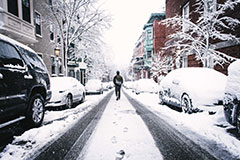How to Prepare for Cold Weather Regions - Vol.342
It's important to be prepared when travelling and this is especially so when driving in or through colder regions where the temperature, visibility conditions, and the driving environment can be at odds with your safety.

According to an international study published in The Lancet, a medical journal, cold weather has killed people at a rate of twenty times more than in hot weather conditions. The 2015 study analyzed more than 74 million deaths worldwide between 1985 and 2012, attributed to 384 locations within 13 different countries. What's peculiar is that, of those deaths, many have been due to moderate weather as opposed to extreme conditions (only one percent of accounted deaths have been due to extreme hot or cold weather).
In the U.S. alone, approximately 900 people are killed and 76,000 injured in vehicle related crashes during snowfall or sleet per year, according to statistics published by the Federal Highway Administration.
Presented with these facts, not taking the proper precautions prior to making the trip can be hazardous to your vehicle and to your own well-being. Having unsuitable clothing, tools, and gear?as well as being unprepared for cases of emergency are a few of the factors that can cause potentially dangerous situations when travelling in colder regions.
Having improper clothing, for example, can lead to cases of cold injury of variable severity such as frostbite or hypothermia. Improper tires, especially in icy conditions, can lead to a lack of traction on an icy road, resulting in the driver and its vehicle not only becoming a road hazard to themselves, but to others sharing the road?especially in high-speed motorways.
The lack of proper tools, a properly maintained vehicle, or even equipment (jumper cables, emergency kit) to assist in emergency situations such as being stranded on the highway can leave you vulnerable to cold weather, and susceptible to injury, or worse: death.
To prevent or at the very least mitigate the chances of encountering such adverse situations, here are some common tips to better prepare yourself for travelling in cold weather conditions:
- Get a Maintenance Checkup
Aside from simply having your gas tank filled, be sure to have your oil, battery, lights, heating and cooling system, breaks, and the rest of your car's components checked prior to travelling. Preventing your car from malfunctioning through proper maintenance checkups can be the one factor that can potentially save your life.
- Winter Washer Fluid
Having proper visibility in hazardous conditions is extremely important to your safety. Dirt, grime, and accumulated ice are some of the many things that can obstruct your vehicle's front glass.
It's doubly important to have the right type of washer fluid in your vehicle's reservoir. Fluid unsuited to the region's cold or freezing temperatures due to the lack of antifreeze present within the solution can cause it to freeze the internal components of your windshield washer system and render it unusable, which is dangerous. Always carry a spare jug in the trunk in your car as a precaution in order to maintain optimal visibility.
- Wiper Blades
Change into winter blades as they are heavier and are more efficient at removing snow and ice. If you already own winter blades, be sure they're still checked for quality. Having the right washer fluid won't help if your vehicle's front and rear wiper blades aren't properly maintained. Old, and worn wiper blades with cracks or tears will greatly reduce its effectiveness at removing dirt, grime, and especially ice.
If you're one to regularly drive through cold weather, it's important to have your wipers replaced at least twice a year. And, if not, it's still important to have the state of your wipers checked before travelling.
- Winter Tires
Be sure to ditch your all-season tires if you're travelling through snowy conditions. Winter tires can grip on icy pavement far better than its all-season counterpart, preventing many cases of sliding. Having the proper traction is important. Combined with good visibility, you'll lessen the chances of collision.
Check for wear if your tires aren't new. As well, be sure to check your tire pressure with a gauge to see if your tires fall within the recommended pressure level; fill with air if necessary at a gas station as the pressure decreases in cold weather.